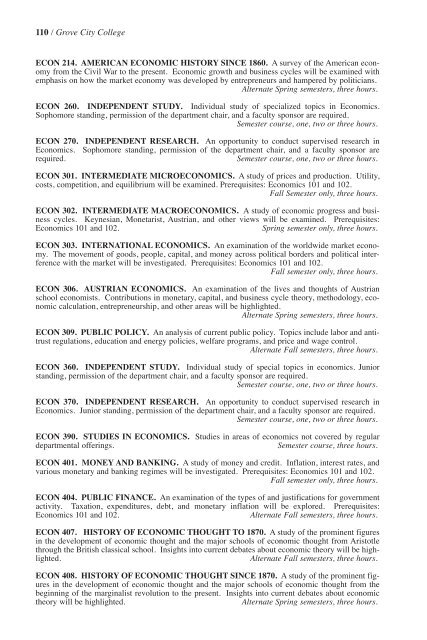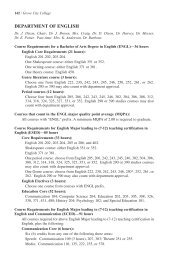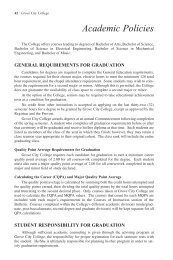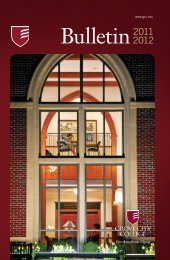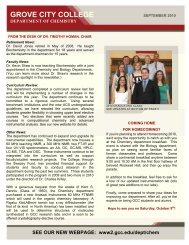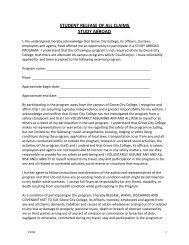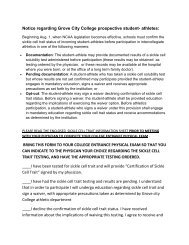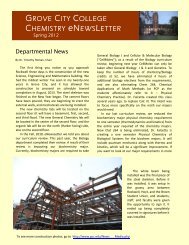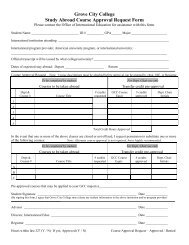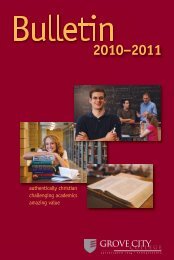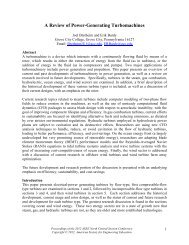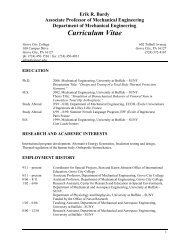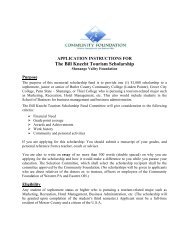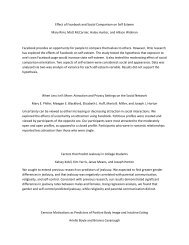2009–2010 - Grove City College
2009–2010 - Grove City College
2009–2010 - Grove City College
Create successful ePaper yourself
Turn your PDF publications into a flip-book with our unique Google optimized e-Paper software.
110 / <strong>Grove</strong> <strong>City</strong> <strong>College</strong><br />
ECON 214. AMERICAN ECONOMIC HISTORY SINCE 1860. A survey of the American economy<br />
from the Civil War to the present. Economic growth and business cycles will be examined with<br />
emphasis on how the market economy was developed by entrepreneurs and hampered by politicians.<br />
Alternate Spring semesters, three hours.<br />
ECON 260. INDEPENDENT STUDY. Individual study of specialized topics in Economics.<br />
Sophomore standing, permission of the department chair, and a faculty sponsor are required.<br />
Semester course, one, two or three hours.<br />
ECON 270. INDEPENDENT RESEARCH. An opportunity to conduct supervised research in<br />
Economics. Sophomore standing, permission of the department chair, and a faculty sponsor are<br />
required. Semester course, one, two or three hours.<br />
ECON 301. INTERMEDIATE MICROECONOMICS. A study of prices and production. Utility,<br />
costs, competition, and equilibrium will be examined. Prerequisites: Economics 101 and 102.<br />
Fall Semester only, three hours.<br />
ECON 302. INTERMEDIATE MACROECONOMICS. A study of economic progress and business<br />
cycles. Keynesian, Monetarist, Austrian, and other views will be examined. Prerequisites:<br />
Economics 101 and 102. Spring semester only, three hours.<br />
ECON 303. INTERNATIONAL ECONOMICS. An examination of the worldwide market economy.<br />
The movement of goods, people, capital, and money across political borders and political interference<br />
with the market will be investigated. Prerequisites: Economics 101 and 102.<br />
Fall semester only, three hours.<br />
ECON 306. AUSTRIAN ECONOMICS. An examination of the lives and thoughts of Austrian<br />
school economists. Contributions in monetary, capital, and business cycle theory, methodology, economic<br />
calculation, entrepreneurship, and other areas will be highlighted.<br />
Alternate Spring semesters, three hours.<br />
ECON 309. PUBLIC POLICY. An analysis of current public policy. Topics include labor and antitrust<br />
regulations, education and energy policies, welfare programs, and price and wage control.<br />
Alternate Fall semesters, three hours.<br />
ECON 360. INDEPENDENT STUDY. Individual study of special topics in economics. Junior<br />
standing, permission of the department chair, and a faculty sponsor are required.<br />
Semester course, one, two or three hours.<br />
ECON 370. INDEPENDENT RESEARCH. An opportunity to conduct supervised research in<br />
Economics. Junior standing, permission of the department chair, and a faculty sponsor are required.<br />
Semester course, one, two or three hours.<br />
ECON 390. STUDIES IN ECONOMICS. Studies in areas of economics not covered by regular<br />
departmental offerings. Semester course, three hours.<br />
ECON 401. MONEY AND BANKING. A study of money and credit. Inflation, interest rates, and<br />
various monetary and banking regimes will be investigated. Prerequisites: Economics 101 and 102.<br />
Fall semester only, three hours.<br />
ECON 404. PUBLIC FINANCE. An examination of the types of and justifications for government<br />
activity. Taxation, expenditures, debt, and monetary inflation will be explored. Prerequisites:<br />
Economics 101 and 102. Alternate Fall semesters, three hours.<br />
ECON 407. HISTORY OF ECONOMIC THOUGHT TO 1870. A study of the prominent figures<br />
in the development of economic thought and the major schools of economic thought from Aristotle<br />
through the British classical school. Insights into current debates about economic theory will be highlighted.<br />
Alternate Fall semesters, three hours.<br />
ECON 408. HISTORY OF ECONOMIC THOUGHT SINCE 1870. A study of the prominent figures<br />
in the development of economic thought and the major schools of economic thought from the<br />
beginning of the marginalist revolution to the present. Insights into current debates about economic<br />
theory will be highlighted. Alternate Spring semesters, three hours.


